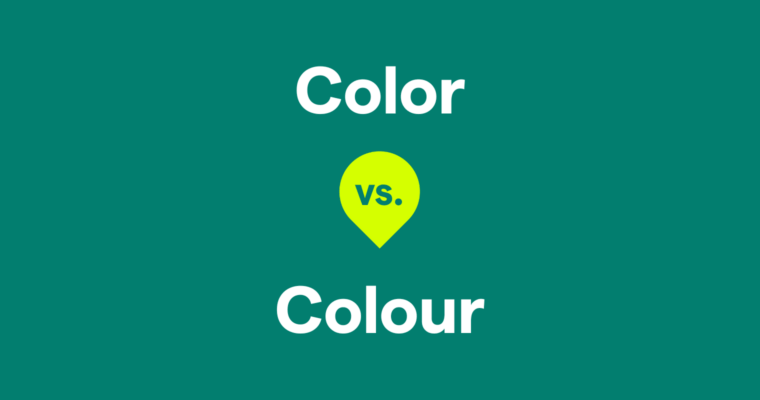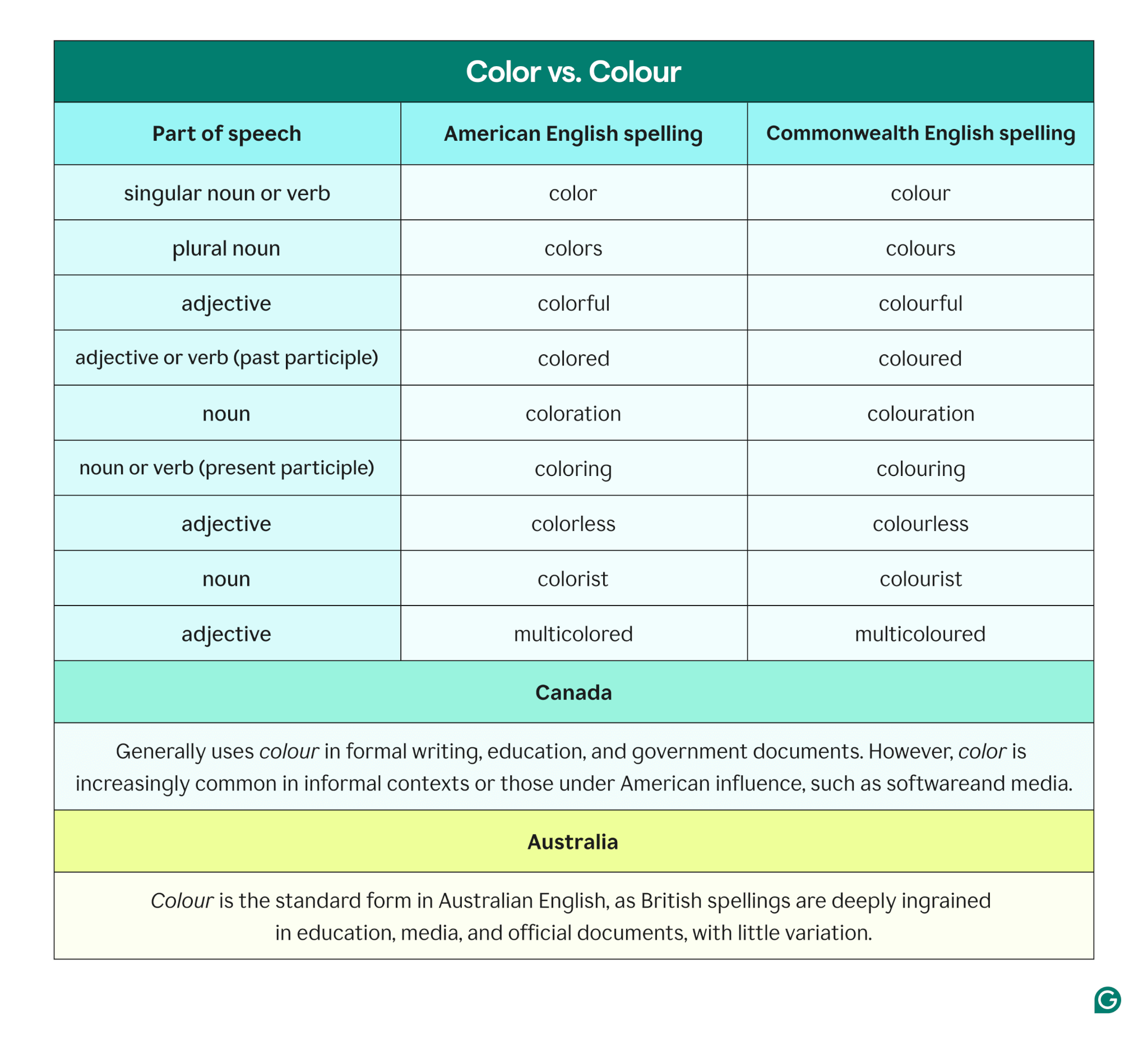
- Writers in the US use the spelling color. British and Commonwealth writers use colour.
- Both spellings are correct depending on where you and your readers live.
- Color and colour use different spellings because of the divergence between US and British cultures.
- Some countries use a hybrid approach to this spelling. For example, Canada uses the Commonwealth spelling but pronounces the word closer to the American-esque dialect.
The distinction between color and colour is a fascinating example of how language evolves to reflect cultural identity and history. Here, we’ll explore the different spellings of color and colour and where to use each depending on your audience.
Table of contents
Definition and pronunciation of color and colour
What’s the difference between color and colour?
Other forms of color and colour
Definition and pronunciation of color and colour
Both color and colour refer to the visual perception of light in different wavelengths, such as red, blue, or green. The word is used to describe hues, pigments, and shades.
- As a noun, color refers to the attributes of things that cause them to be perceived visually in different hues.
- As a verb, it means to apply color to something or to change something’s color (e.g., “She decided to color the drawing using crayons.”).
Given that cultural conventions influence the written form, pronunciation can also vary slightly by region. In the US and associated areas, the word is commonly pronounced “KULL-er,” while some speakers in the UK may articulate it with a subtler ending, closer to “KULL-uh.”
However, these differences are minor, and the pronunciation is largely similar across English dialects. Canadians, for instance, often use the Commonwealth spelling (colour) but typically adopt American pronunciation norms.
What’s the difference between color and colour?
The main difference between color and colour is their spelling. These variations represent distinct dialects: Color aligns with American English, while colour is used in British and Commonwealth English. Despite this difference, the meaning of the two words is exactly the same.
With slight variations, most dialects of English fall into one of two categories: American English and Commonwealth English. American English represents the speaking and writing style in the US and those in its sphere of influence. In contrast, Commonwealth English is the style in the UK and countries in its realm, such as Australia, Canada, and South Africa.
While the variance between the two is more pronounced in the spoken language, each also possesses distinct spellings. One excellent example of this lies in the difference between color vs. colour.
Why are color and colour spelled differently?
Color and colour are spelled differently today due to a purposeful effort by Americans to diverge from British traditions. To understand how that occurred, it’s important to understand how and why Commonwealth English includes the u.
English began as a hybrid of French and Germanic dialects, which had solidified into one cohesive language by the early 17th century. In general, English kept the basis of its Germanic influences (such as syntax and pronunciation) while incorporating large amounts of French vocabulary and spelling. The French influence is evident in the u in colour.
Following the American Revolution and the establishment of the US as an independent entity, US culture purposefully evolved away from the British. Academics also sought to implement changes to the language to accommodate this mandate.
The definitive document of this effort was Noah Webster’s “American Dictionary of the English Language.” To make the language easier to pronounce, Webster adopted phonetic spellings of some words to make them more in line with everyday pronunciation, evidenced by color vs. colour.
Is it color or colour?
The short answer is “both.” Where you and your audience live determines whether the word is spelled color or colour.
Use color if you and your readers live in:
- The US
- A US colony
- A former US colony
- East Asia
- Latin America
In contrast, use colour if you and your readers live in:
- The UK
- A member of the Commonwealth
- A former UK colony or Commonwealth country
- Europe
- South Asia
If your audience spans both communities, use the spelling you are comfortable with. Above all, maintaining consistency within your writing is more important than the spelling you use in this context.
Other forms of color and colour
Given that color is both a noun and a verb, it’s important to understand alternate forms of the words determined by conjugation, use, and location. Use this table to navigate these decisions:

Examples of color vs. colour
Because the only difference between the two is their spelling, you can use either word interchangeably, depending on the conventions of the place you use it. Here are some examples:
- American English: The color catches the eye.
- Commonwealth English: The colour catches the eye.
- American English: They did a great job of coloring within the lines.
- Commonwealth English: They did a great job of colouring within the lines.
- American English: The garden was a colorful tapestry of blooming flowers.
- Commonwealth English: The garden was a colourful tapestry of blooming flowers.
While the decision to use color vs. colour is influenced by the rich history of the English language, the actual differences between the two spellings are minimal. Consider the linguistic conventions of your readers’ location when determining whether to use color or colour, and keep it consistent throughout your writing.
Color vs. colour FAQs
Is color or colour the correct spelling?
Both color and color are correct depending on the location of you and your readers. Color is preferred in the US, US colonies, former US colonies, East Asia, and Latin America. Colour is preferred in the UK, the Commonwealth, former UK colonies and commonwealths, Europe, and South Asia.
Are color and colour pronounced the same way?
Yes, color and colour are pronounced the same way. In most English dialects, they are both pronounced as “KULL-er.” However, regional accents may add slight variations, such as the softer ending with some British accents, but the overall pronunciation remains consistent across both spellings.
Should you use color or colour for international audiences?
If you are writing for an international audience, choose the spelling you are most comfortable with, but maintain consistency throughout your writing. Keep in mind that there are more Commonwealth English speakers than American English speakers worldwide, so colour might resonate with a larger audience in certain contexts.
Why does American English use simplified spellings for words like color?
American English adopted simplified spellings for words like color as part of a broader effort to establish a distinct cultural and linguistic identity following the American Revolution. Noah Webster, a key figure in this movement, promoted phonetic spelling in his American Dictionary of the English Language to make English more logical and accessible.






